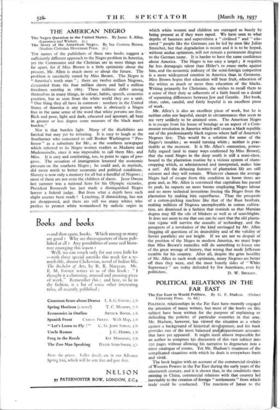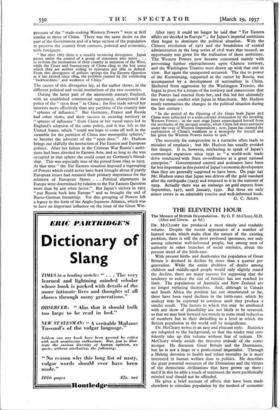POLITICAL RELATIONS IN - THE FAR EAST The Far East
in World Politics. By G. F. Huds3n. (Oxford University Press. 7s. 6d.) POLITICAL relationships in the Far East have recently engaged the attention of many writers, but .most of the books on this subject have been written for the purpose of explaining or defending the policies of particular countries in that area. Mr. Hudson, however, has viewed the situation as a whole against a background of historical daeximent, and his book provides one of the most balanced • passionate accounts that have yet appeared: It might seem almost impossible for an author to compress his discussion of this vast subject into 250 pages without allowing his narrative to degenerate into a mere catalogue of events. Yet Mr. Hudson's treatment of the complicated situations with which he deals is everywhere fresh and vivid.
The book begins with an account of the commercial rivalries of Western Powers in the Far East during the early years of the nineteenth century, and it is shown that, in the conditiohs then existing in China, commercial relations with that country led inevitably to-the creation of foreign "settlements "from which trade- could be conducted. The reactions of Japan to the
pressure of the "trade-seeking Western Powers" were at fiat
similar to those of China. There was the same desire on the part of the Government and of a large section of the population to preserve the country from contacts, political and economic, with foreigners.
"But after 1865 there is a steadily increasing divergence. Japan passes under the control of a group of statesmen who strive . . . to re-form the institutions of their country in imitation of the West, while the Court and bureaucracy of China cling to the lost cause which they are neither willing to renounce nor able to defend. From this divergence of policies springs the Far Eastern Question as it has existed since 1894, the problem created by the continuing ' backwardness ' and weakness of China."
The causes of this -divergence lay, ai the author shows, in` the " different political and social institutions of the two countriei.
During the latter part of the nineteenth century England, with an established commercial supremacy, championed the policy of the "open door" in China ; for free trade served her interests more effectively than any partition of the country into "spheres of influence.'" But Germany, France and Russia had other views, and their success in securing territory pr "spheres of influence" from China or her vassal states led to England's adoption of the same policy, and it was left to the United States, which "could not hope to come off well in the scramble for the partition of China into monopolist spheres," to become the advocate of the "open door." Mr. Hudson brings out skilfully the interaction of Far Eastern and European politics. After her failure in the Crimean War Russia's ambi- tions had been directed to Eastern Asia, and so long as she was occupied in that sphere she could count on Germany's friend- ship. This was especially true of the period from 1895 to 1905. At that time "the Far Eastern situation imposed a regrouping of Powers which could never have been brought about if purely European issues had retained their primary importance for the relations of European States. . . . Political alignments in Europe were determined by relation to the Far Eastern Question more than by any other factor." But Japan's victory in 1905 "put Russia back into Europe" and so brought the end of Russo-German friendship. Yet this grouping of Powers left a legacy in the form of the Anglo-Japanese Alliance, which was to have an important influence on the issue of the Great War.
After 1905 it could nd longer be said that "Far Eastern
affairs are decided in Europe " ; for Japan's imperial ambitions then began to dominate the political situation. With the Chinese • revolution of sxi and the breakdown of central administration in the long series of civil wars that ensued, an opportunity was given for the realisation of those ambitions.
The Western Powers now became concerned mainly with preventing further eficroachments upon Chinese territory, and the Washington treaties were drawn up with that end in view. But again the unexpected occurred. The rise to power of the Kuomintang, supported at the outset by Russia, was accompanied by a development of nationalism in China. - Sheltered from aggression by the Washington Treaties, she began to press for axeturn of territory and concessions that the Powers had exacted from her, and this led her ultimately into the tragic conflict with Japan in Manchuria. Mr. Hudson neatly slimmnrises the changes in the political situation during the last century : "In the period of the Opening of the Gates both Japan and China were subjected to a semi-colonial domination by the invading Western Powers in the next stage japan emancipated herself from
the servitudes of unequal treaties, while China fell more and more under the sway of Western Imperialism ; now, Japan has claimed the exploitation of China's weakness as a monopoly for herself and has given the Western Powers notice to quit.'
The necessity for compression in a narrative often leads to mistakes of emphasis ; but Mr. Hudson has usually avoided this danger. It is, however, misleading to speak of Japan's commercial expansion since 1932 as "a world-wide trade drive conducted with State co-ordination as a great national enterprise." Governmental control and assistance have been far less important in this period of Japan's economic development than they are generally supposed to have been. On page 242 Mr. Hudson states that Japan was driven off the gold standard after the earthquake (1923) and returned to it in the summer of
1929. Actually there was an 'embargo on gold exports from September, 1917, until January, 1930. But these are only minor errors in an admirably concise. and well-informed book. G. C. ALLEN.





































































 Previous page
Previous page